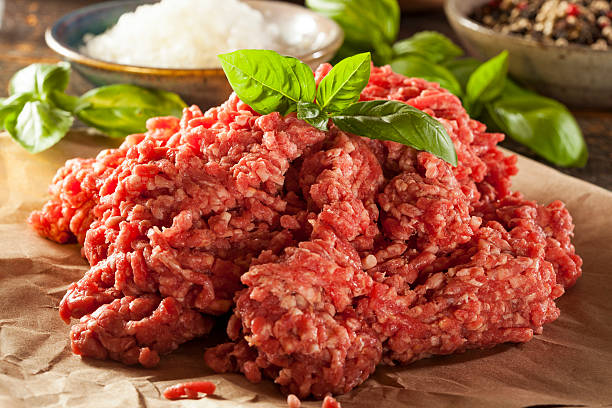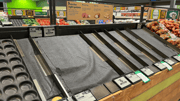
Picture yourself doing the weekly shop at your local ALDI, tossing that familiar pack of mince into your trolley without a second thought. For most of us, it's such a routine act that we barely register it. But for one Melbourne shopper, that ordinary purchase became the centre of a police investigation that's got authorities asking important questions about food safety.
A customer in Victoria claims they found a needle in mince meat bought from ALDI, with the meat allegedly purchased from a store in Keilor East, Melbourne.
Police are investigating after the foreign object was found in meat purchased from the supermarket on 2 October.
While incidents like this naturally raise concerns, especially for those of us who've been around long enough to remember the 2018 strawberry needle crisis, it's worth understanding both your rights as a consumer and the reality of food safety in Australia.
How serious are these incidents really?
Before we dive into panic mode, let's put this in perspective. Food-borne illness impacts around 4.7 million people a year in Australia, with meat and poultry among the most common culprits.
However, the vast majority of these cases stem from poor handling, storage, or cooking rather than deliberate contamination or foreign objects.
Police are urging anyone who has encountered a dangerous item in meat products to come forward, aiding in the determination of the scope of the issue.
This suggests authorities are treating this as a potentially isolated incident while remaining vigilant for any patterns.
'Police are investigating after a foreign object was found in meat purchased from a supermarket in Keilor East on October 2'
The investigation echoes memories of the 2018 strawberry needle crisis, when strawberries grown in Queensland and Western Australia were found to be contaminated with sewing needles.
That incident led to nationwide panic, hundreds of reports, and ultimately resulted in significant changes to food safety protocols and penalties.
Your consumer rights and protections
Australia has strict regulations and standards to make sure our foods are safe—whether local or imported. As a consumer, you have several layers of protection and clear rights if you encounter contaminated food.
Australian Consumer Law includes laws against misleading or deceptive conduct and mandatory guarantees around quality, fit for purpose, and refunds that heavily apply in food sales.
This means if you purchase food that's contaminated or unsafe, you're entitled to a full refund, replacement, or repair—and the business can't simply offer store credit.
What should you do if you find something concerning?
If you discover a foreign object in your food, here's the step-by-step approach authorities recommend:
Immediate steps:
- Don't panic, but stop eating the product immediately
- Preserve the evidence—keep both the object and remaining food
- Take photos if possible
- Note where and when you purchased the item
Reporting process:
In general, produce contamination—that is an item of machinery in processed food—should be reported to local councils in the first instance. However, if the contamination appears deliberate (like a needle), police should be contacted directly.
In Victoria, councils enforce food safety laws, using options ranging from advice and warnings, to temporary closure of the premises, to prosecution.
Who to contact when you find contaminated food
Accidental contamination (machinery parts, packaging): Local council health department
Suspected deliberate contamination: Police immediately
For refunds/compensation: Contact the retailer first, then ACCC if needed
Food recalls: Check Food Standards Australia New Zealand (FSANZ) website
The legal consequences are severe
Anyone considering food contamination as some sort of prank should think again. Food tampering is taken extremely seriously by Australian authorities, with penalties that reflect the potential harm to public health and trust.
Food contamination offences can result in up to 10 years imprisonment, as mentioned in the original report about this case. Breaches of the Competition and Consumer Act 2010 and the Australian Consumer Law attract fines and pecuniary penalties. Some are criminal and can result in monetary fines or jail time.
The penalties reflect the serious nature of these crimes—they don't just affect individual consumers but can damage entire industries and cause widespread public health concerns.
Smart shopping strategies for peace of mind
While incidents like the ALDI needle claim are rare, there are simple steps you can take to shop more safely:
At the store:
- Check packaging for tears, punctures, or tampering
- Look for products that appear to have been resealed
- Choose items from the back of the shelf when possible
- Report any suspicious packaging to staff immediately
At home:
- Inspect meat products before preparation
- Use proper food handling and storage techniques
- When in doubt, throw it out—it's not worth the risk
Your food safety checklist
- Always check packaging integrity before purchase
- Report concerns to council (accidental) or police (deliberate)
- Know your consumer rights—you're entitled to full refunds for unsafe food
- Keep evidence if you find contamination
- Remember: these incidents are rare but taken seriously by authorities
The bigger picture of Australian food safety
Food Safety Australia New Zealand coordinates and monitors food recalls. The Australian Government and state and territory governments enforce the standards, in line with their food legislation.
This multi-layered approach means that when incidents do occur, there's a comprehensive system in place to investigate, respond, and prevent future occurrences.
To protect public health and safety, businesses must immediately remove from distribution, sale and consumption any food found to be unsafe.
The system works because it involves everyone from producers to retailers to regulatory bodies, all working to maintain the integrity of Australia's food supply.
Staying informed without staying worried
While it's natural to feel concerned when stories like the ALDI needle claim emerge, remember that our food safety system is designed to catch and respond to these issues quickly.
The fact that this incident triggered an immediate police investigation and media coverage shows the system is working as intended.
All food businesses in Australia are required to follow the Food Standards Code and establish a Food Safety Program. This means the overwhelming majority of food you purchase has been through rigorous safety protocols.
The key is staying informed without becoming overly anxious. Check official sources like FSANZ for food recalls, trust the regulatory system, and know your rights as a consumer.
What's your experience with food safety concerns while shopping? Have you ever had to return contaminated food, and how did your local store handle it? Share your thoughts and experiences in the comments below—your insights could help fellow readers shop with confidence.
Original Article
https://au.news.yahoo.com/claim-needle-found-aldi-mince-080711462.html
Police investigate shopper’s Aldi claim
Cited text: A customer in Victoria claims they found a needle in mince meat bought from Aldi, prompting police to launch an investigation. The meat was allegedly ...
Excerpt: A customer in Victoria claims they found a needle in mince meat bought from Aldi, with the meat allegedly purchased from a store in Keilor East, Melbourne.
https://au.news.yahoo.com/claim-needle-found-aldi-mince-080711462.html
Police investigate shopper’s Aldi claim
Cited text: “Police are investigating after a foreign object was found in meat purchased from a supermarket in Keilor East on October 2,” a spokesperson said.
Excerpt: Police are investigating after the foreign object was found in meat purchased from the supermarket on October 2.
https://au.news.yahoo.com/claim-needle-found-aldi-mince-080711462.html
Safe Meat Handling: A Guide for Food Businesses
Cited text: Food-borne illness impacts around 4.7 million people a year in Australia, with meat and poultry among the most common culprits.
Excerpt: Food-borne illness impacts around 4.7 million people a year in Australia, with meat and poultry among the most common culprits.
https://blog.foodsafety.com.au/safe-meat-handling-a-guide-for-food-businesses
Aldi Shoppers Warned: Urgent Alert After Disturbing Find in Meat Package! - TudoAquiUSA
Cited text: Police are urging anyone who has encountered a dangerous item in meat products to come forward, aiding in the determination of the scope of the issue....
Excerpt: Police are urging anyone who has encountered a dangerous item in meat products to come forward, aiding in the determination of the scope of the issue.
https://tudoaquinews.com/news/aldi-...t-alert-after-disturbing-find-in-meat-package
Police investigate shopper’s Aldi claim
Cited text: In 2018, there was a nationwide food crisis after strawberries grown in Queensland and Western Australia were found to be contaminated with sewing nee...
Excerpt: strawberries grown in Queensland and Western Australia were found to be contaminated with sewing needles.
https://au.news.yahoo.com/claim-needle-found-aldi-mince-080711462.html
Food standards and safety | Australian Government Department of Health, Disability and Ageing
Cited text: Australia has strict regulations and standards to make sure our foods are safe—whether local or imported.
Excerpt: Australia has strict regulations and standards to make sure our foods are safe—whether local or imported.
https://www.health.gov.au/topics/food-and-nutrition/about/food-standards-and-safety
Food Labelling Laws in Australia: Compliance Essentials for Businesses | Sprintlaw
Cited text: Australian Consumer Law: Laws against misleading or deceptive conduct and mandatory guarantees around quality, fit for purpose, and refunds heavily ap...
Excerpt: Australian Consumer Law includes laws against misleading or deceptive conduct and mandatory guarantees around quality, fit for purpose, and refunds that heavily apply in food sales.
https://sprintlaw.com.au/articles/f...stralia-compliance-essentials-for-businesses/
Police investigate shopper’s Aldi claim
Cited text: ... “In general, produce contamination — that is an item of machinery in processed food — should be reported to local councils in the ...
Excerpt: In general, produce contamination—that is an item of machinery in processed food—should be reported to local councils in the first instance.
https://au.news.yahoo.com/claim-needle-found-aldi-mince-080711462.html
Food safety, enforcement and penalties
Cited text: In Victoria, councils enforce food safety laws, using options ranging from advice and warnings, to temporary closure of the premises, to prosecution.
Excerpt: In Victoria, councils enforce food safety laws, using options ranging from advice and warnings, to temporary closure of the premises, to prosecution.
https://www.health.vic.gov.au/food-safety/food-safety-enforcement-and-penalties
Fines and penalties | ACCC
Cited text: Breaches of the Competition and Consumer Act 2010 and the Australian Consumer Law attract fines and pecuniary penalties.
Excerpt: Breaches of the Competition and Consumer Act 2010 and the Australian Consumer Law attract fines and pecuniary penalties.
https://www.accc.gov.au/business/compliance-and-enforcement/fines-and-penalties
Fines and penalties | ACCC
Cited text: Some are criminal and can result in monetary fines or jail time.
Excerpt: Some are criminal and can result in monetary fines or jail time.
https://www.accc.gov.au/business/compliance-and-enforcement/fines-and-penalties
Food standards and safety | Australian Government Department of Health, Disability and Ageing
Cited text: Food Safety Australia New Zealand coordinates and monitors food recalls.The Australian Government and state and territory governments enforce the stan...
Excerpt: Food Safety Australia New Zealand coordinates and monitors food recalls. The Australian Government and state and territory governments enforce the standards, in line with their food legislation.
https://www.health.gov.au/topics/food-and-nutrition/about/food-standards-and-safety
Food standards and safety | Australian Government Department of Health, Disability and Ageing
Cited text: To protect public health and safety, businesses must immediately remove from distribution, sale and consumption any food found to be unsafe.
Excerpt: To protect public health and safety, businesses must immediately remove from distribution, sale and consumption any food found to be unsafe.
https://www.health.gov.au/topics/food-and-nutrition/about/food-standards-and-safety
Food Safety in Australia: How to Implement Food Standards Code?
Cited text: All food businesses in Australia are required to follow the Food Standards Code and establish a Food Safety Program.
Excerpt: All food businesses in Australia are required to follow the Food Standards Code and establish a Food Safety Program.
https://www.fooddocs.com/post/food-safety-in-australia







